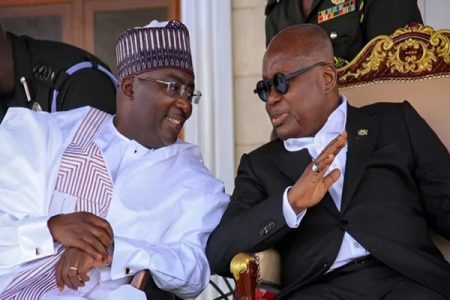The Akufo-Addo-Bawumia administration has marked a significant economic milestone by achieving a positive trade balances after 36 years of running a negative trade balance, commonly referred to as a trade deficit.
Last trade surplus was in 1982
The last time the country recorded a trade surplus was in 1982 when it amounted to $1 billion, representing 0.36% of the Gross Domestic Product (GDP).
Trade deficit from 1983 to 2019
Between 1983 and 2019, Ghana consistently experienced a negative trade balance, facing challenges in bridging the gap between exports and imports.
Akufo-Addo-Bawumia break jinx in 2023
However, the year 2020 marked a turnaround, breaking the long-standing trend with a positive trade balance of $2.05 billion.
This positive momentum continued in 2021, with Ghana maintaining a trade surplus of $1.1 billion, although it saw a slight decline compared to the previous year.
The trend persisted in 2022, as the country recorded another trade surplus, this time amounting to $1.82 billion.
In 2023, Ghana’s resilience and strength in trade dynamics were further emphasized with a notable trade surplus of $2.6 billion.
The current account surplus increased to $2.2 billion in the first nine months of 2024, compared with a surplus of $912 million over the corresponding period in 2023.
This positive development is indicative of the country’s growing economic stability and effective management of its trade relations.
Data from the Bank of Ghana’s Summary of Macroeconomic and Financial Data reveals encouraging trends in Ghana’s economic landscape, particularly in trade, with substantial growth in exports and positive impacts on international reserves.
$16.6bn exports, $14bn imports in 2023
As of December 2023, Ghana’s export earnings surged to $16.6 billion, surpassing the estimated expenditure of $14 billion on imports during the same period.
This marks a notable increase from the November 2023 export and import figures of $14.9 billion and $12.8 billion, respectively.
$17.4bn exports in 2022
On a year-on-year basis, total exports witnessed a slight decrease from the $17.4 billion recorded in the corresponding in 2022.
Contribution of commodities
Key contributors to the robust export performance include gold and cocoa, contributing $7.6 billion and $2.1 billion, respectively.
Additionally, oil exports accounted for $3.8 billion, with other exports contributing the remaining $3 billion.
Import composition
Breaking down imports, oil and non-oil imports played significant roles, accounting for $4.4 billion and $9.5 billion, respectively, of the total import value.
Impact on reserves
The positive trade balance has contributed to an increase in Ghana’s gross international reserves, reaching $5.9 billion by the end of December 2023 from $4.9 billion at the end of September 2023.
This growth, in turn, led to a marginal increase in the country’s import cover, rising from 2.3 months in September to 2.4 months in October.
Net International Reserves
Ghana’s net international reserves have experienced a marginal increase, standing at $3.1 billion as at December 2023 compared to the $2 billion recorded in September 2023.
Economic significance
The positive trade balance, accounting for 3.4% of GDP, represents a noteworthy improvement from the 2.7% recorded in November 2023.
This data highlights the economic significance of Ghana’s trade performance and its positive impact on the nation’s financial resilience.
As Ghana navigates global economic uncertainties, the buoyancy in trade, supported by key commodities and prudent management of reserves, positions the country for continued economic stability and growth.
The data serves as a testament to Ghana’s economic resilience and its ability to leverage trade dynamics for sustained development.
The positive trade balance is a crucial factor in a nation’s economic health, reflecting that the value of exports exceeds that of imports. It provides room for increased investments, foreign exchange reserves, and potential economic growth.
The government’s economic policies and initiatives, as well as global market dynamics, have played a significant role in steering Ghana towards this positive trajectory.
The diversified export portfolio, improvements in export quality, and strategic trade partnerships have contributed to this favorable outcome.
Ghana’s achievement of a positive trade balance in 2023 is celebrated as a milestone and a testament to the country’s economic resilience.
The continuous efforts to strengthen trade relationships, boost exports, and manage imports efficiently have positioned Ghana on a path of sustained economic growth and prosperity.
By ELVIS DARKO, Accra
- GMA furious over suspension of duty waiver on vehicles - 3 April 2025
- Thursday, April 3, 2025 Newspaper Headlines - 3 April 2025
- Trump slaps tariffs: Ghana, UK-10%, EU-20%, others-50% - 2 April 2025

